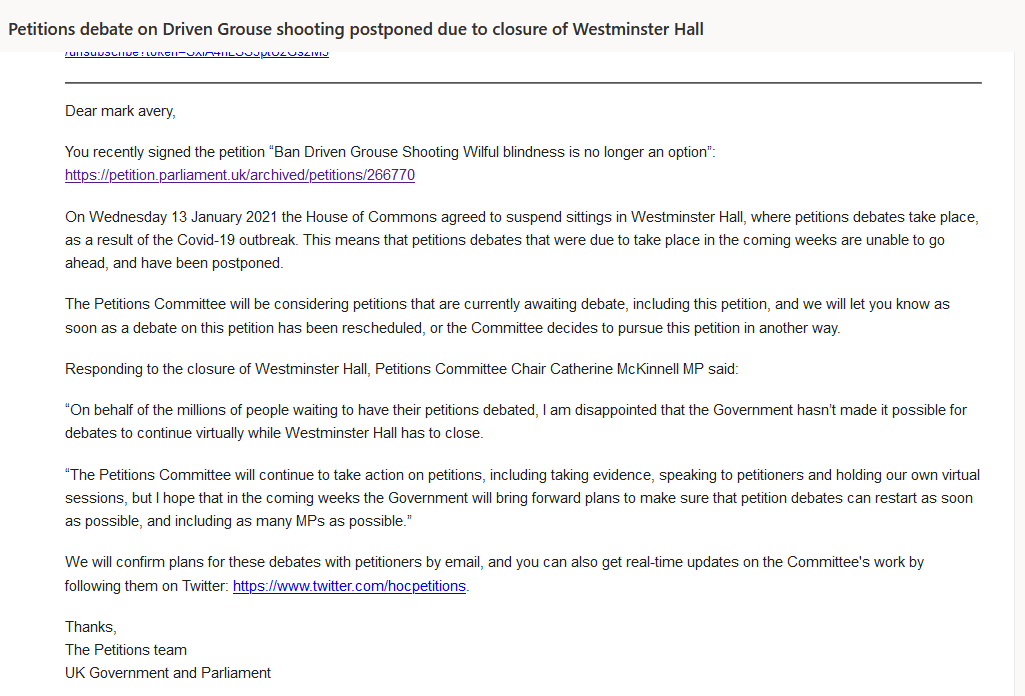
This email arrived overnight to tell me that debates in Westminster Hall are now postponed due to COVID. It’s a shame that the ‘Don’t criminalise trespass‘ petition won’t get its well-deserved debate and ‘Ban driven grouse shooting‘ also has to wait for a few more weeks for its latest outing.
But it makes quite a lot of sense, to some extent, that meetings of MPs for these important but non-essential debates will be affected at these times.
I was amused to see that the (standard) email told me that I signed the Ban driven grouse shooting petition ‘recently’ – it was actually in July 2019 some weeks before it was actually published and more than 18 months ago.
The Chair of the Petitions Committee, Catherine McKinnell MP (Newcastle upon Tyne North) says ‘On behalf of the millions of people waiting to have their petitions debated, I am disappointed that the Government hasn’t made it possible for debates to continue virtually while Westminster Hall has to close.’ and she has a point.
Our ancient institutions are creaking under the strain of COVID even though technological solutions exist. This doesn’t come as a shock. The Westminster Parliamentary petitions have an impressive infrastructure of online technology behind them but when you tip up in person to watch and listen to such a debate, as is your right and so should it be, there are a very small number of uncomfortable benches on which you can sit with an overflow room with a TV screen provided if more than c30 people wish to attend in person. At least these debates are available online, and there are excellent transcripts available the next day. But the system hasn’t yet (after 10 months of coronavirus) found a way to allow the MP participants to attend virtually. It’s slightly difficult to see why not except for the fact that interventions into others’ short speeches are made quite tricky in Teams/Zoom etc. It would be nice to see progress on this and I hope that the Leader of the House, the honourable member for the eighteenth century, might give it some thought when stretching out on the Front Bench some time.
I am a great fan of petitions to parliaments (as you may have noticed) because although they are not referenda by any means, they are another way for the people to say ‘Oi!’ to our elected representatives on particular issues. Parliamentary petitions have a long and largely esteemed history and we need to find a way to make them work more smoothly in the modern world.
I am gaining experience of how another institution, the law (in particular, the courts) deals with similar issues of justice not only being done but being seen to be done. If you roll up to a court in person then the system is slightly suspicious of you (since few of us ever do) as a citizen wanting to see what’s happening, but it more or less copes in a guarded way. You are not greeted with a smile but usually with a list of things you mustn’t do. And you’ll find another set of cramped, creaking and uncomfortable wooden benches provided for you.
These days, when almost all court hearings are held online, you can’t just stroll along. It’s difficult enough to attend if you are a party to the action (and you are likely to get a link to the event in an email from the court that discloses your email address to all other potential attendees – but you get theirs in return!) but there is no way for others to see what is happening as, in theory, you could do by attending court, in normal times.
I’d like the hundreds of you who funded my initial judicial review of brood meddling, and our upcoming appeal, to be able to see what’s happening but the legal system makes no provision for that to happen. OK, we are in exceptional times but they are becoming the new normal and the principle of open access to justice should apply to observing it as well as getting it.
[registration_form]